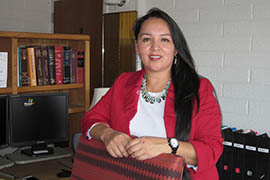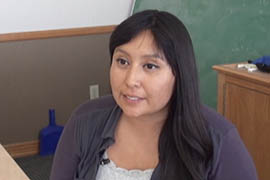Cronkite News has moved to a new home at cronkitenews.azpbs.org. Use this site to search archives from 2011 to May 2015. You can search the new site for current stories.
Program connects Native Americans with environmental careers
FLAGSTAFF – A summer internship with the Environmental Protection Agency gave John Begay his first experience at the Grand Canyon and a better understanding of the air quality problems facing the Navajo Nation.
“The canyon is just so mind-blowing, and it’s sad that millions of people come every year and some may not really get to see it because there are so many days with haze,” said Begay, a Navajo studying environmental science at Northern Arizona University.
Begay, who is from Ganado, got his internship through the Institute of Tribal Environmental Professionals, an NAU-based organization that provides seminars, research programs and technical expertise in air and water quality and solid waste management for tribes across the United States.
The internships – offered as summer-long or one-week sessions – allow Native American students and others interested in environmental protection to put their book knowledge to practical use, said Mansel Nelson, the institute’s internship coordinator.
“These students are on a career path and need to network with tribal agencies and other organizations to be able to see what their future roles will be,” he said.
Unlike politics, air and water quality issues don’t stop at county, state or reservation borders, making environmental science important for the 23 sovereign tribes in Arizona, Nelson said.
Begay’s work at the Grand Canyon, which continued in subsequent internships, involved collecting air-quality readings at EPA monitoring stations. But he said he learned much more than environmental science.
“I can actually get up and talk in front of people now,” he said. “I’ve even talked to a crowd of almost a hundred people.”
Steven Tallas, an NAU environmental engineering student from Rough Rock on the Navajo Nation, said his internship with Engineers Without Borders had him designing solar-powered monitors to track water flow on the reservation.
“For an engineering student, those are fun projects,” Tallas said. “You design it, make sure it’s working and go on to the next project.”
Beyond internships, the institute offers educational outreach, a focus that had Tallus teaching grade school students in Tuba City how solar-powered lights can be used instead of kerosene lamps.
“The kids are smart, and they figure out real quick how the solar lights can maybe help their families, like to help Grandma find her sheep,” he said.
Ann Marie Chischilly, the institute’s executive director, said it’s important for Tallas and others to go into schools.
“Younger children don’t know they are excited about science and the environment until they see some of the ways it is important to their lives,” she said.
This year the institute offered 14 summer internships and a like number of one-week internships. Other internship partners include the U.S. Department of Energy.
The result, Chischilly said, is a workforce for tribes needing environmental scientists.
“These students are the future, the next in line,” she said. “And it’s important for them to be able to blend institutional knowledge with traditional views when it comes to environmental protection of tribal lands.”
Tomika Tohdacheeny, a Navajo from Kayenta, said her internship with her tribe’s Office of Environmental Health helped her better understand the relationship between the environment and public health, a lesson that has her taking public health courses now.
“When you learn that it’s the fleas on prairie dogs that cause diseases like plague, you realize how important the environment is to our health,” Tohdacheeny said.
Johna Boulafentis, who completed an internship with the Idaho Nez Perce in 2004, now works for that tribe and is a mentor for interns from the institute.
“Not only do they learn different environmental science, they get an equal learning in a different tribal culture – one that is centered in water and fishing,” she said.
Begay, Tallas and Tohdacheeny each said they will seek environmental jobs on the Navajo Nation after graduation.
“The reason is simple,” Tallas said. “It’s my home and I want to give back.”








